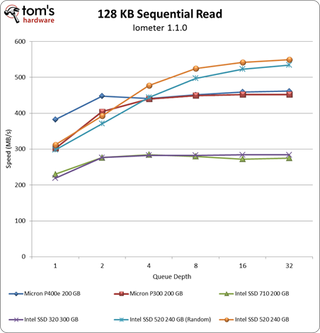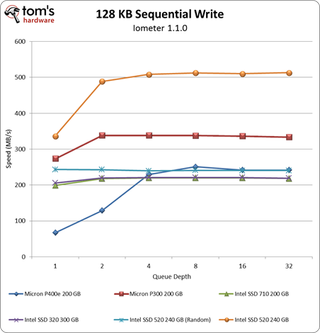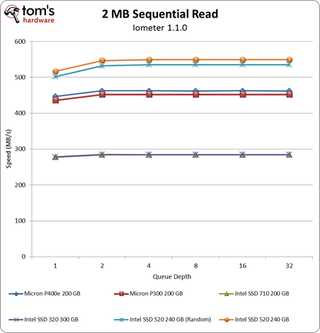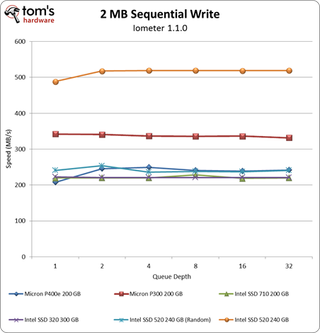Micron's RealSSD P400e: Affordable SSD Storage For The Enterprise?
128 KB And 2 MB Sequential Performance
128 KB Sequential

Micron's P400e serves up sequential read throughput just short of 400 MB/s at a queue depth of one, landing it at the top of the pack. However, as commands start piling up, the performance lead evaporates. With four or more concurrent commands outstanding, the SLC-based P300 roughly matches the P400e's performance at 450 MB/s.
The SSD 520 is the only drive able to punch through 500 MB/s. Intel, as a company, does not dominate in this test, though. The SSD 320 and 710 employ a homegrown 3 Gb/s controller that cap performance under 300 MB/s.

At a queue depth of one, the P400e delivers about 70 MB/s in 128 KB sequential writes, though performance improves considerably as the commands start stacking up, topping out around 240 MB/s. In comparison, the 3 Gb/s SSD 320 and 710 are capable of ~210 MB/s regardless of queue depth.
Intel's SandForce-based SSD 520 pushes about ~240 MB/s when it's presented with incompressible data. That's good enough to best the P400e at low queue depths and match it as requests increase.

Moving to a larger block size minimizes the impact of queue depth. Using 2 MB transfers, Micron's P400e serves up throughput between 5-10 MB/s faster than the SLC-based P300—a respectable accomplishment, particularly as the SSD 320 and 710 are bound by their SATA 3Gb/s interfaces.
Intel's SSD 520 is the only drive able to outmaneuver the P400e with a sequential write speed close to 550 MB/s. Incompressible data has little effect on the SSD 520's performance; read speeds only fall by ~10 MB/s.
Stay on the Cutting Edge
Join the experts who read Tom's Hardware for the inside track on enthusiast PC tech news — and have for over 25 years. We'll send breaking news and in-depth reviews of CPUs, GPUs, AI, maker hardware and more straight to your inbox.

Sequential 2 MB write results are similar to what we saw from the 128 KB sequential writes, but without the impact of queue depth weighing on performance. Intel's SSD 520 still reigns supreme when it's presented with compressible data. Incompressible data knocks it close to the bottom of the chart, though.
Micron's P400e performs modestly, coming close to matching the SSD 520's performance with incompressible data.
Current page: 128 KB And 2 MB Sequential Performance
Prev Page 4 KB Random Performance Next Page Power Consumption-
ethanolson I wonder if the poor performance is part of some mechanism that ensure higher reliability. Maybe lower read and write voltage increase endurance but take longer to populate the cell with the appropriate charge level.Reply
Just sayin'. -
mayankleoboy1 ReplyRelease Date: 04/11/2012
Firmware for the m4 SSD is being updated from version 0309 to 000F. The m4 is updatable to this new firmware starting from versions 0001, 0002, 0009, or 0309 in a single step. If updating from an early version directly to 000F, all interim improvements will also be include.
Changes between version 0309 and 000F include the following changes:
Improved compatibility with certain SAS expanders and peripheral RAID cards.
Improved throughput stability under extremely heavy workloads.
Improved data protection in the event of unexpected, asynchronous power loss.
This firmware update is recommended for all drives currently in the field if the end user is experiencing any of these symptoms.
m4 firmware updated to a newer version. -
jaquith Seems like the perfect SSD for a third-rate data center and not mine.Reply
If SoftLayer (f/k/a ThePlanet) wants to lower their standards then good for them, and perhaps they need yet another law suit or reevaluate their published up-time with some more asterix *. -
lutel The only thing that is important for me is full disk encryption in desktop environment. Unfortunately Intel completly forgot and since Q66 chipset there is no mainboard supporting FDE with SSDs. Q77 probably could support it, but there is no BIOS that has "hard disk / ATA password" option. Intel, wake up!!!Reply -
cknobman Not impressed at all. I dont really see one redeeming feature this drive has that would get it chosen over many other SSD's on the market.Reply -
Is it just me or do I notice that we really need to SAVE SLC from extinction? I mean, naturally high performance (compression or none), better temperature control, and higher longevity are the greatest features of SLC - good for the environment, pocketbooks, and peace of mind long term. Anyone?Reply
Most Popular

